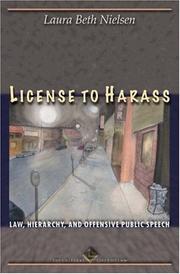| Listing 1 - 1 of 1 |
Sort by
|

ISBN: 1282129481 9786612129483 1400826292 9781400826292 9781282129481 6612129484 0691119856 0691126100 Year: 2006 Publisher: Princeton, N.J. ; Woodstock : Princeton University Press,
Abstract | Keywords | Export | Availability | Bookmark
 Loading...
Loading...Choose an application
- Reference Manager
- EndNote
- RefWorks (Direct export to RefWorks)
Offensive street speech--racist and sexist remarks that can make its targets feel both psychologically and physically threatened--is surprisingly common in our society. Many argue that this speech is so detestable that it should be banned under law. But is this an area covered by the First Amendment right to free speech? Or should it be banned? In this elegantly written book, Laura Beth Nielsen pursues the answers by probing the legal consciousness of ordinary citizens. Using a combination of field observations and in-depth, semistructured interviews, she surveys one hundred men and women, some of whom are routine targets of offensive speech, about how such speech affects their lives. Drawing on these interviews as well as an interdisciplinary body of scholarship, Nielsen argues that racist and sexist speech creates, reproduces, and reinforces existing systems of hierarchy in public places. The law works to normalize and justify offensive public interactions, she concludes, offering, in essence, a "license to harass." Nielsen relates the results of her interviews to statistical surveys that measure the impact of offensive speech on the public. Rather than arguing whether law is the appropriate remedy for offensive speech, she allows that the benefits to democracy, to community, and to society of allowing such speech may very well outweigh the burdens imposed. Nonetheless, these burdens, and the stories of the people who bear them, should not remain invisible and outside the debate.
Public spaces --- Threats --- Libel and slander --- Hate speech --- Freedom of speech --- Social conflict --- Extortion --- Public places --- Social areas --- Urban public spaces --- Urban spaces --- Cities and towns --- Free speech --- Liberty of speech --- Speech, Freedom of --- Civil rights --- Freedom of expression --- Assembly, Right of --- Freedom of information --- Intellectual freedom --- Law and legislation --- Social aspects
| Listing 1 - 1 of 1 |
Sort by
|

 Search
Search Feedback
Feedback About UniCat
About UniCat  Help
Help News
News